FREE AP English Language and Composition Close Reading Practice Test
The easiest way to sum up this text is as
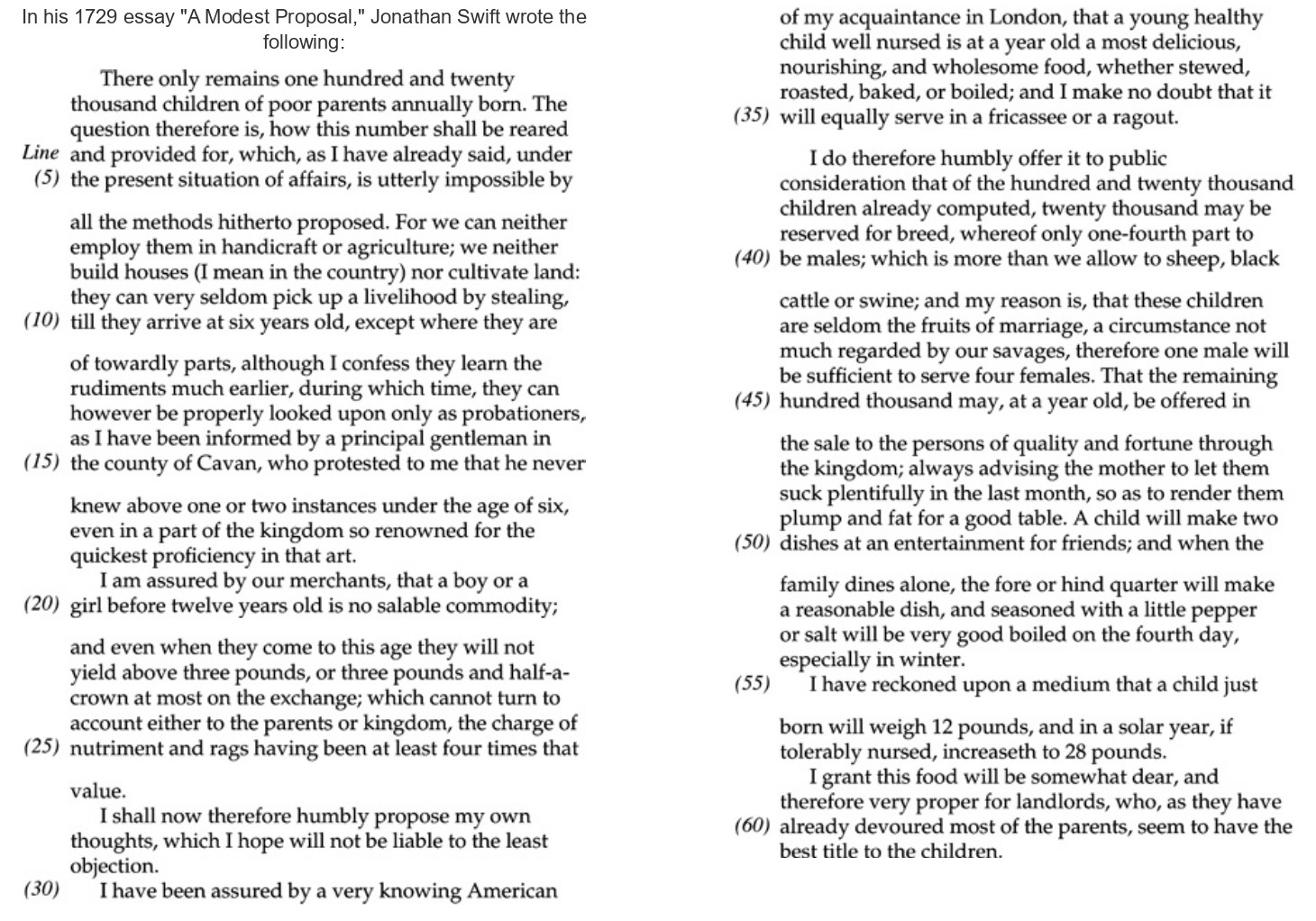
This first piece, which is from Jonathan Swift's "A Modest Proposal," is rather simple, as is frequently the case on the actual exam. Make sure you answer this one correctly because it serves as a foundation for many of the next questions. The key is to realize that the author is not making a serious proposal; rather, he is parodying other so-called scientific studies that, in the name of humanitarianism, tend to offer cruel (if not sadistic) "solutions" to poverty. If you take the author's proposal seriously, then four of the answers [(A), (C), (D), and (E)] are plausible. As a result, the only correct response is (B).
The author uses questionable sources in the first, second, and fourth paragraphs.

Even if you've never heard the phrase "arguments from authority," you can probably imagine what it means. The authorities given include "our merchants" (paragraph 2), "a very knowing American of my acquaintance in London," and "a principal gentleman in the county of Cavan" (paragraph 1). (paragraph 4). These are obviously questionable authorities, which is one of the passage's humorous elements. Examining the fourth and shortest paragraph is the quickest and easiest method to employ POE in this situation. There is no need to look for similes (C) or extended metaphors (D) in the first or second paragraphs because there aren't any in the fourth paragraph. Even if the other two solutions are more arcane, logic compels you to rule them out even though you may not fully comprehend what they mean as rhetorical terms. You can simply rule out answer four because there is nothing in paragraph four that even somewhat resembles an appeal or makes an attempt to make a point (E).
Line 13, "Probationers," refers to

Answers (B) and (C) are quickly discounted since they only superficially relate to the phrase "probationers," which exists in the question (and text). Answer (E) tempts you to hastily connect the word "art" at the end of the paragraph with an artist. This reduces the options to (A) and (D), but it is obvious that the children's "livelihood" is just theft—the only "trade" available to impoverished children during the early stages of the Industrial Revolution—rather than a formal trade. The term "probationers" therefore refers to "children learning to steal," or option A.
Because of this, the statement in lines 24-26 that reads, "the charge of nutriment and rags having been at least four times that value," is funny

The brilliant juxtaposition of the phrase "nutrition and rags" is what gives the joke its humor. Food in the first term is even more formal than what we may anticipate, which sets the stage for expectations in dress in the second term. Instead, the author hits the reader with rags, a startling replacement for clothing. None of the other explanations, while more or less conceivable, has anything to do with humor. The use of hyperbole (E) was gratuitous; frequently, students will be persuaded to choose a response just because it includes a rhetorical phrase and seems to be the most sophisticated option.
Line 35's "fricassee" is unmistakably a Fricative (n)
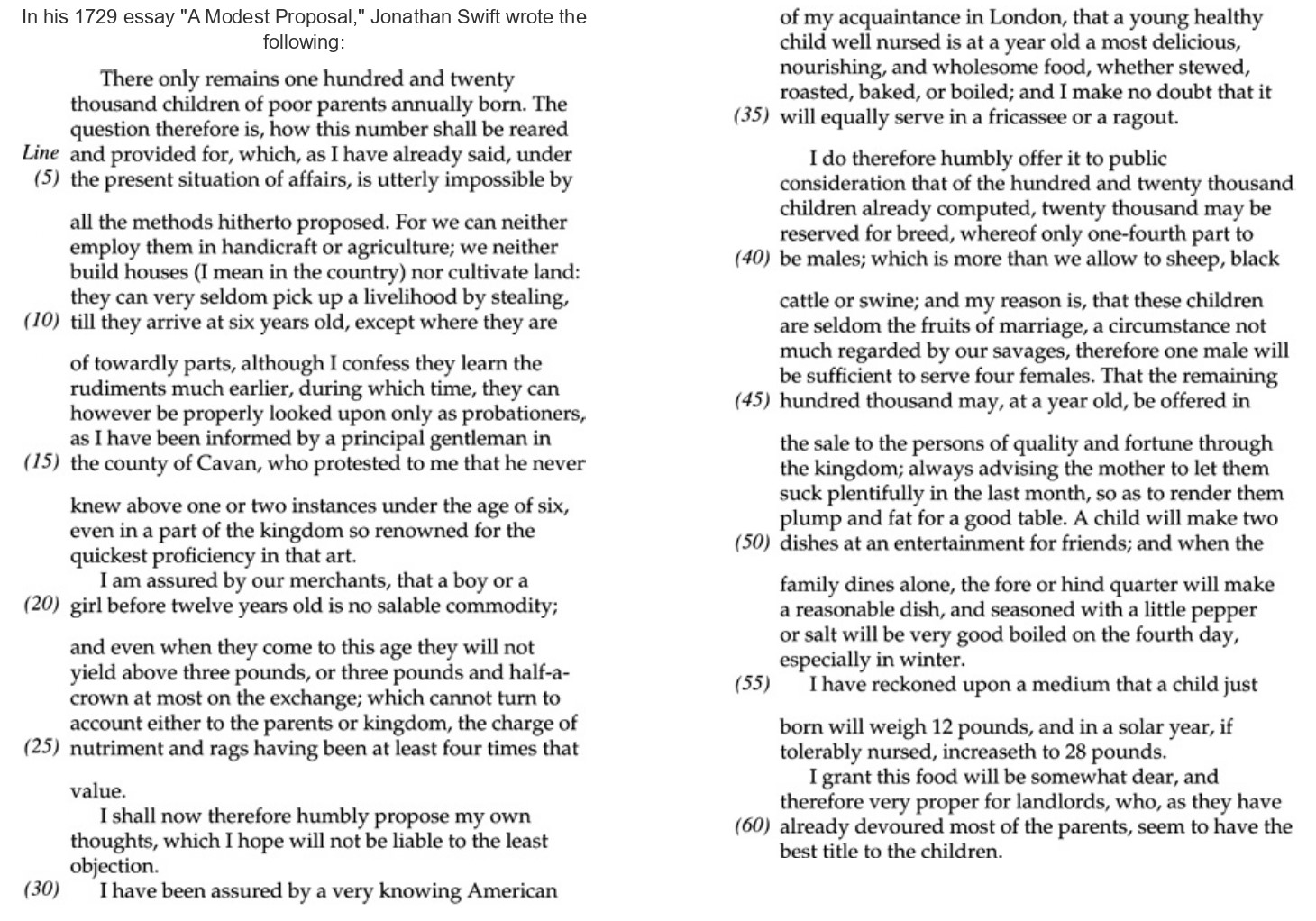
The answer to this question should be evident if you read the sentence in context, even though you are presumably unfamiliar with the word because the entire paragraph is about food and you are likely already familiar with terms like stewed, roasted, baked, and boiled. You should have been able to rule out the other options—"animal," "kid," "place," and "master"—at the very least by reading the term in context.
In lines 36 to 44, the author uses the typical rhetorical device of
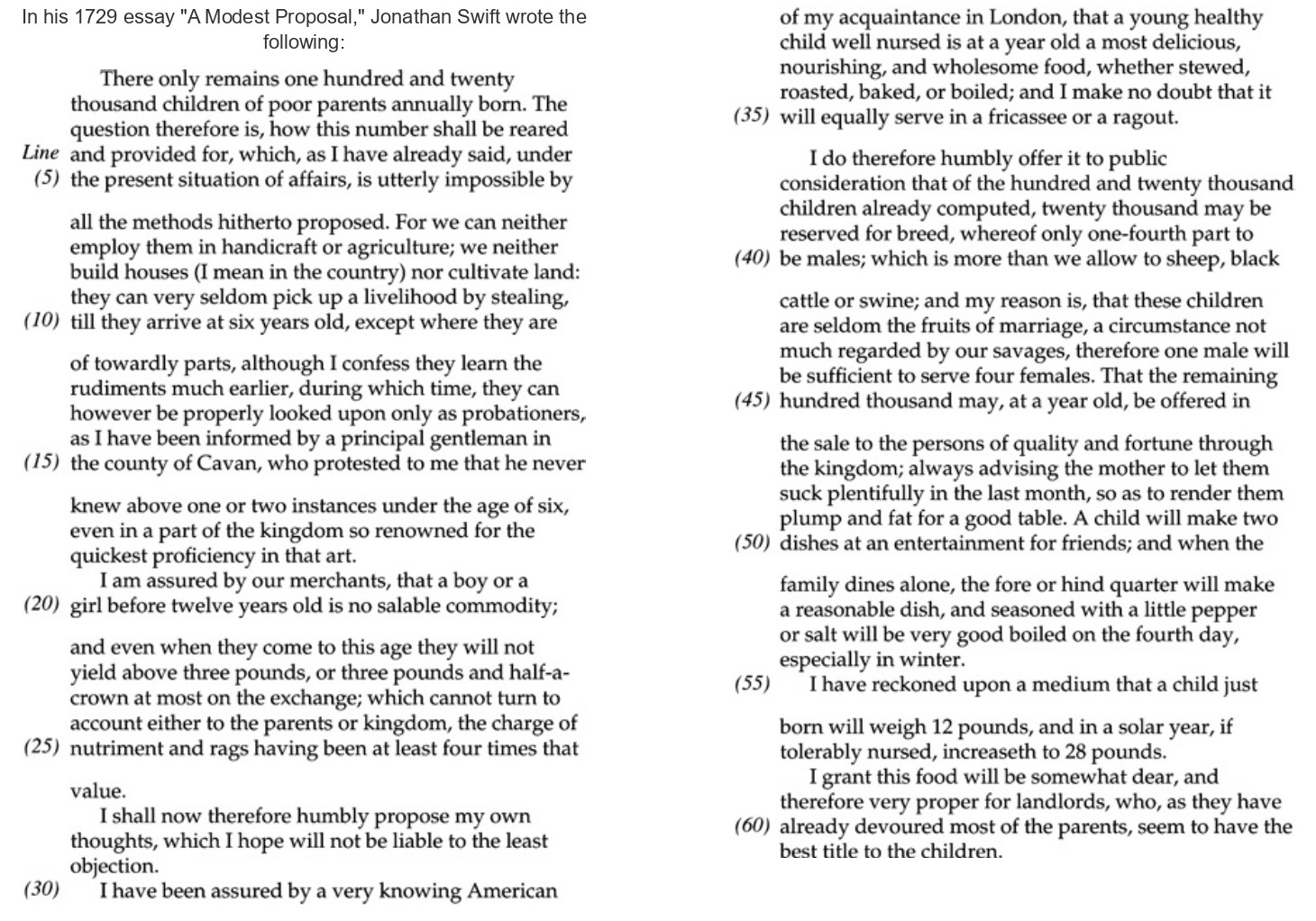
POE is the most effective method for answering this query. Answers (E) and (B) are immediately out. Answer (C) is also completely incorrect if you keep in mind that "deductive reasoning" refers to starting with a generality and proceeding logically to a specific conclusion. The phrase "which is more than we allow to sheep, black cattle, or swine" in the paragraph may urge you to choose Answer (A), but this paragraph is not dominated by analogies. Although this comparison is extensive, a pattern cannot be drawn from it. The best response is "Process analysis" (D); in this passage, the author analyzes an issue and suggests a procedure that will result in a solution. The method for breeding, fattening, and processing this highly uncommon source of protein is described in the proposal.
Lines 47–48's statement, "always advise the mother to let them suck abundantly in the last month," furthers the parallel between the kids and

The previous query is connected to this one. The idea is to raise the children as livestock and fatten them for slaughter (sheep, cattle, or pigs).
Advertisement
"Dear" in line 58 means

You should be able to easily reduce your options to (A) and (C) utilizing POE. According to the author, only wealthy landowners will be able to afford the new meat because it will be so pricey.
"devoured" (line 60) is a suitable word in this situation because
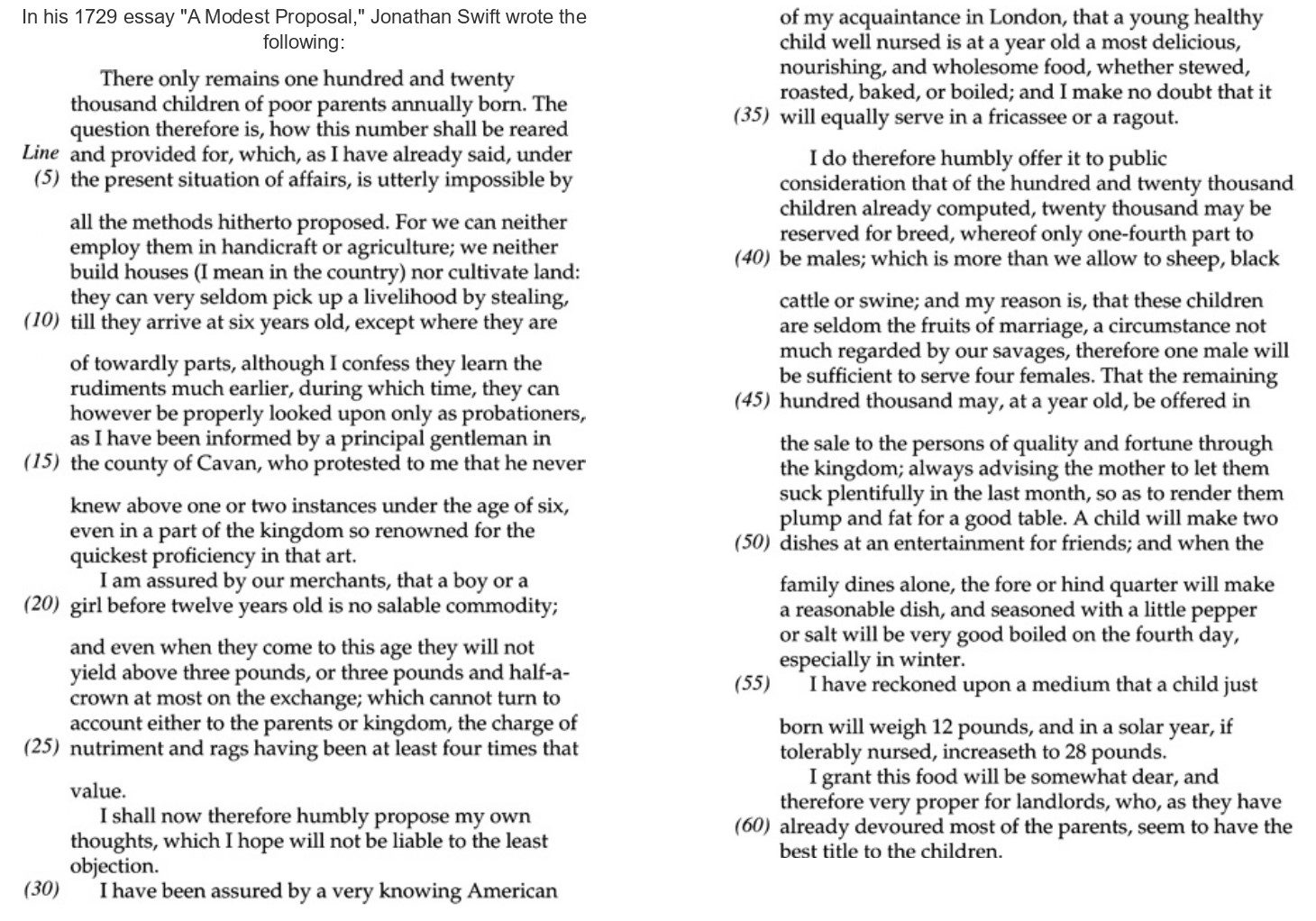
You must have absorbed the satire at this point to comprehend that the landlords may as well literally devour (consume) the children of their low-income tenants since they had "devoured" the parents by demanding unreasonable rents. It makes sense that response (B) would tempt you, but this sentence's diction hardly constitutes a revelation. We have known the viewpoint all along; hidden beneath the humorous satire is the fury of a guy repulsed by how the privileged take advantage of the poor.
The author claims that the proposal

Although this ridiculous idea is economically sound, it does not benefit the poor, hence it is evident that solutions (B), (C), and (D). We can eliminate that option as well thanks to the "only" in response (E). The idea helps the wealthy by giving them access to a huge supply of a meal that, among other things, will be fashionable and suitable for a wide range of recipes. Additionally, society will not have to worry about caring for older children who are too young to work but old enough to need clothing and food if the children are slaughtered while they are newborns. The wealthiest, who ostensibly have this obligation, stand to gain financially if this cost is reduced.
The passage's first line includes the following
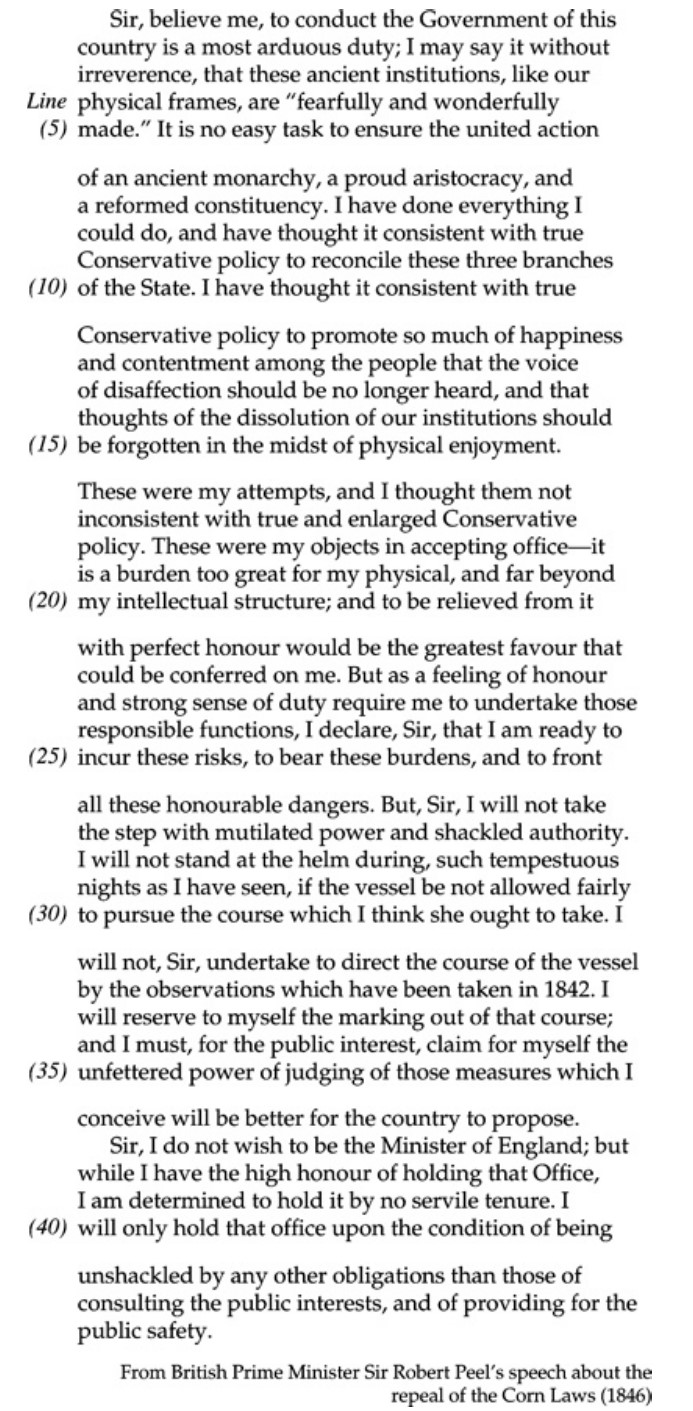
The first statement uses a simile to link the august but rather antiquated bodies of the members of Parliament to the enormous and ancient parliamentary institutions. Before delivering what amounts to a very serious ultimatum, the speaker amuses his audience with a little of comedy before saying that he will continue to serve as prime minister but only if they give him substantially more authority than they did before (1842).
The speaker is talking to
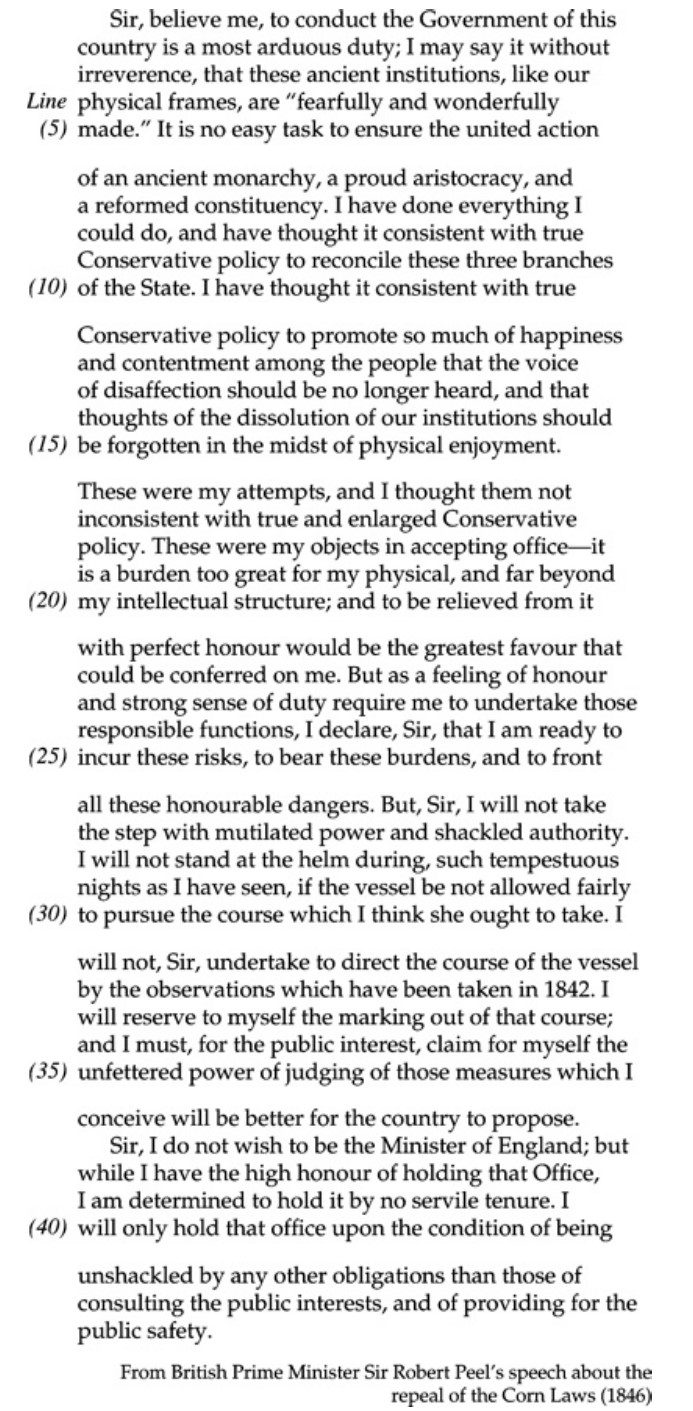
The other members of Parliament, who are the speaker's peers, are present. The repetition of "Sir," a British political etiquette, makes this problematic because it makes it appear as though the prime minister is speaking to each member of Parliament separately. The following phrases confirm that he is the minister of England, and they also unambiguously show that he is addressing to peers: "Sir, I don't want to be the Minister of England, but since I have the honor of doing so, I'm determined to keep that position without using servile means. I shall only assume that position under the condition that I am free from all commitments outside those to consult with the public and to ensure its safety."
The most major change occurs in
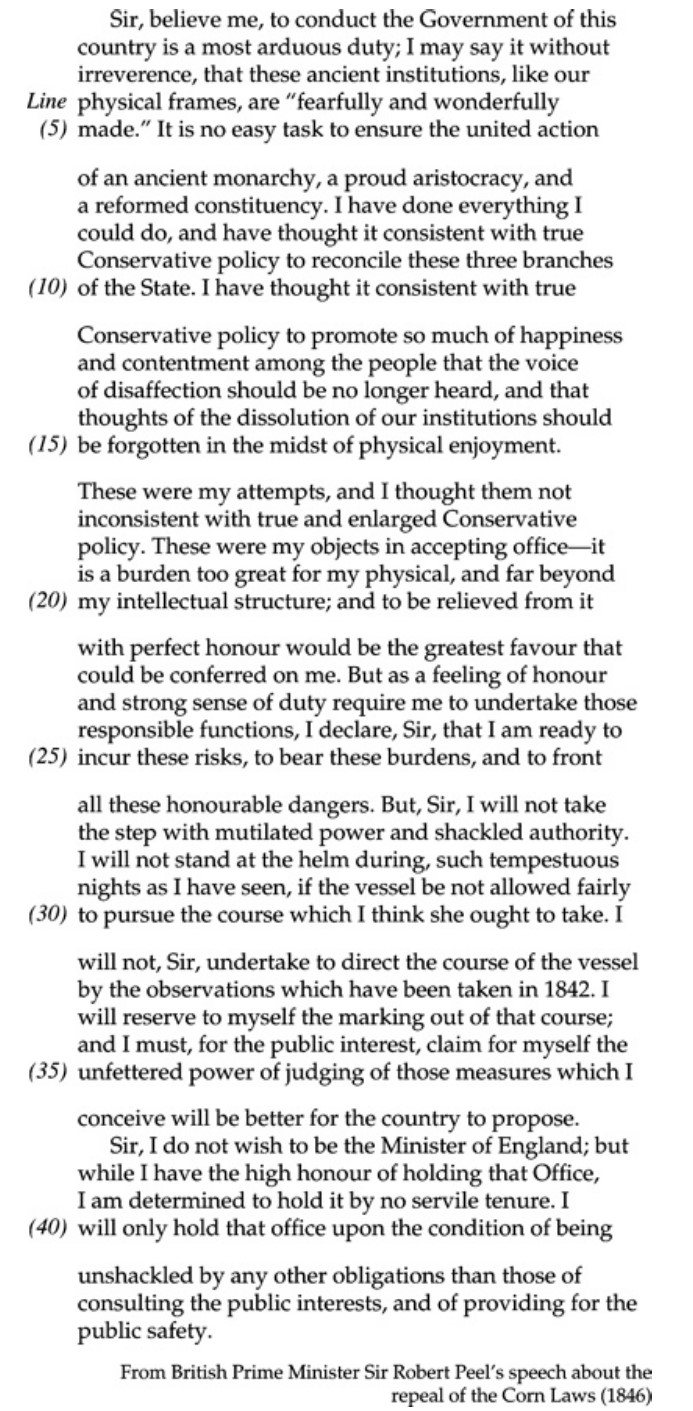
The minister's real message is introduced in the lines that come before this; up to this point, he has made jokes, reviewed his past motivations and deeds as the leader of the Conservative party, and explained why he accepted to serve as prime minister once more despite his deteriorating health and aging mind ("feeling of honor") ("a burden too great for my physical, and far beyond my intellectual structure"). "But, Sir, I will not take the step with mangled power and shackled authority," follows the transition. He will benefit the nation and his peers, but only if given far more power to dominate.
The following are all a part of the same elaborate metaphor. EXCEPT

Your ability to eliminate (D), (C), and (E) should make it easy for you to leave behind (B) and (A), which do not neatly fit into the nautical terminology. The answer (B) should be ruled out. The other words all easily fit into the nautical lingo. While "unshackled" is obviously irrelevant to this metaphor, one could argue that "reasonably" is related to fair weather.
Advertisement
Which phrase from the first paragraph sets up the main idea in the conclusion?

It goes without saying that the first stage is to identify the "dominant point" of the last paragraph. The second paragraph, which is thankfully brief and serves as a rhetorical summary of his ultimatum, is short. "Servile tenure" and "unchained by any other duties" are the important phrases. Unshackled and "unfettered" are synonyms, hence the correct response is (C), "unfettered."
According to the paragraph, the speaker's desire for being prime minister is primarily determined by

In particular, the line that follows shows that the minister's motivation is honor: "The greatest favor you could do for me would be to let me leave my job with absolute honor. But because I have a strong sense of responsibility and an obligation to uphold my honor, I hereby announce to you, sir, that I am willing to take these risks, carry these responsibilities, and face all of these honorable hazards." In this section, the word "honor" appears multiple times.